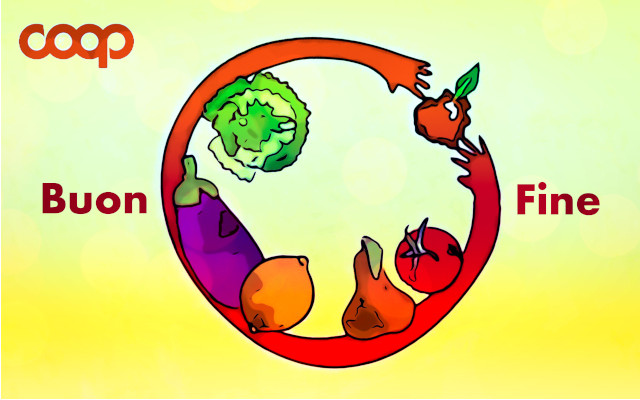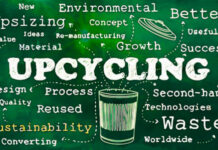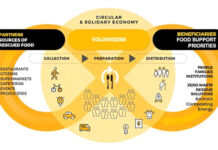Reducing food waste is a crucial goal to which Coop Italia-the Italian pioneer of sustainability in retail-has dedicated its Coop for future strategy since 2015.
The most celebrated initiatives in Italy are ‘Buon fine‘ and ‘Eat me now,’ due to their significant impact in social, environmental and economic terms, (1,2). But there is much more.
Chiara Faenza – head of sustainability and value innovation at Coop Italia – shares her vision and commitments on the food waste front with GIFT(Great Italian Food Trade).
1) Food waste prevention, the role of retail
The agribusiness sector as a whole participates in energy consumption and greenhouse gas emissions, globally, in the respective shares of about 30 percent and 22 percent. And a significant share of consumption and emissions-whose estimate is still uncertain, pending shared methods of data collection (3)-is absorbed by foodlosses and waste(food loss, food waste).
Large-scale retail trade (GDO, retail) plays a key role in food waste prevention, taking into account:
- design of branded products (
private label
), management and quality control on huge volumes of food, - Proximity and ease of interaction with consumers,
- vocation to partnerships with other operators and networking with associations and charities.
2) Coop Italy, the EU Code of Conduct.
Coop Italia is the first Italian retailer, as well as one of the first 65 European operators, to adhere to the EU Code of Conduct on Responsible Business and Marketing Practices in the Food Sector. With a code of conduct that passes with flying colors the feared risks of
greenwashing
of the European initiative-thanks to the concreteness and effectiveness of the from farm to fork commitments-even in the fight against food waste.
3) The ‘Good Ending‘ Project
‘Good end’
is the project developed by Coop Italia-which in its time contributed to the development in Italy of the ‘Good Samaritan Law‘-in collaboration with voluntary associations and organizations. For the donation of food that is fit for consumption but ‘unsaleable,’ such as unsold perishable food at the end of the day and products with damaged packaging (but still organoleptically and hygienically intact).
‘Cooperatives have donated 5,642 tons of foodstuffs-capable of generating more than 11 million meals-at a value of about 28 million euros. To benefit 938 associations and voluntary organizations throughout Italy. The ‘Good End’ involved 60 percent of the distribution network, or 680 outlets‘, Chiara Faenza explains. And the project has been supplemented in recent years with the redistribution of parapharmaceuticals, pet food and baby food.
4) The ‘Eat me now‘ project.
‘Eat Me Now’
is Coop Italy’s project that provides up to 50 percent discount on unsold food products close to the expiration date. Fresh packaged and ultra-fresh products, such as dairy and cured meats, red and white meats, fish, and fourth range (packaged fruits and vegetables).
The initiative now involves 836 outlets, which represent 75 percent of the distribution network of member cooperatives. In some cases, the sale was also extended to products partially damaged in the packaging, in compliance with hygiene and food safety requirements.
The total value of food sales at discounted prices of up to 50 percent through the ‘Eat Me Now‘ project exceeded 38 million in 2022.
5) Culture of responsible consumption
‘Culture is one of the determinants of social welfare and serves responsible consumption, social dialogue and active citizenship.’
Coop strongly believes in the role of the supermarket as an educator of the consumer and must act to guide and build demand together with the consumer.
This creates a virtuous circle that is the same one that builds the circular economy, in which all elements influence each other’ (Chiara Faenza, Coop Italia).
5.1) ‘Use-by‘ and ‘Best before‘
A momentous breakthrough was the replacement of the expiration date(use-by) with the minimum shelf life(best before) – on the labels of some foods such as yogurt and fermented milks – on Coop brand products, in line with EFSA recommendations (2020).
Awareness campaigns are essential to bring responsible consumption up to date. Follow the storage conditions stated on the label, understand the difference between expiration date and shelf life, to avoid unnecessary food waste.
5.2) The ‘Re-generation School‘ project.
‘Re-generation School’
is Coop Italia’s project aimed at contributing to the education of students in schools on the social and environmental issues associated with the consumption and use choices of products and services.
Food safety and food security, integrity and transparency of supply chains, quality of life (environment and health), work ethics, conscious use of technology and the web.
6) Sustainable packaging
The Coop for Future strategy includes a range of interventions to reduce greenhouse gas emissions and food waste including through sustainable packaging. Material reduction alone has already saved about 2.9 million tons of C02 between 2015 and 2020. And it is still growing, with 85 percent of suppliers of Coop-branded products joining.
The National Packaging Consortium (CONAI) has given Coop Italia 75 awards between 2019 and 2022 for its own-brand sustainable packaging. As well as awarding it, in 2021, foreco-design of packaging in the context of the circular economy. And to have nominated it, as the only retailer, for the Best Sustainability Brands 2022 award.
6.1) Ecodesign of packaging, recycling collection
‘An ecodesign packaging must meet basic needs, without which it would be unusable. First, it must ensure food hygiene and safety, it must be environmentally and economically sustainable, and finally it must be machinable and logistically viable‘ (Chiara Faenza, Coop Italy).
Innovation requires work on ‘continuous implementation of eco-friendliness with suppliers,’ which affects packaging in each category of branded products as well as boxes for moving goods. And it is accompanied by rigorous procedures to improve waste collection at the point of sale.
7) European research, upcycling
‘Weare very interested in the prospect of integrating products obtained by upcycling processes within our supply chain and are currently involved in two European research consortia in this area,’ Chiara Faenza adds.
In fact, the circular economy is one of the priorities of European research programs (Horizon 2020, Horizon Europe). And Coop Italy participates in it, thanks also to our Wiise benefit, (5) in the projects
- ProFuture, for the use of microalgae as new sources of sustainable plant proteins in the food chain, (6)
- EcoeFISHent, for the virtuous recovery of waste from the fish supply chain and its upcycling into nutraceutical and cosmetic ingredients. (7)
#Wasteless! (8)
Dario Dongo and Giulia Pietrollini
Notes
(1) Coop Alliance 3.0. Good end, a cooperative action to fight waste together
https://www.coopalleanza3-0.it/cooperativa/comunita/buon-fine.html
(2) Coop Shop. Eat me now: discounts on expiring products https://www.coopshop.it/p/mangiami-subito-sconti-sui-prodotti-in-scadenza/
(3) United Nations. The Sustainable Development Goals Report 2022. 7.7.22 https://unstats.un.org/sdgs/report/2022/
(4) Coop. Code of Conduct. 29.4.22 https://food.ec.europa.eu/horizontal-topics/farm-fork-strategy/sustainable-food-processing/code-conduct_en#signatories
(5) Dario Dongo. Wiise Srl benefit company, impact report 2021. GIFT (Great Italian Food Trade). 6.9.22
(6) Dario Dongo. ProFuture, microalgae to feed the planet. The EU research project. GIFT (Great Italian Food Trade). 18.6.19
(7) Dario Dongo, Andrea Adelmo Della Penna. EcoeFISHent, upcycling and blue economy in the fish supply chain. The EU research project. GIFT (Great Italian Food Trade). 18.10.21
(8) Dario Dongo and Andrea Adelmo Della Penna. Wasteless, EU research project on circular economy and blockchain. GIFT (Great Italian Food Trade). 5.9.22









